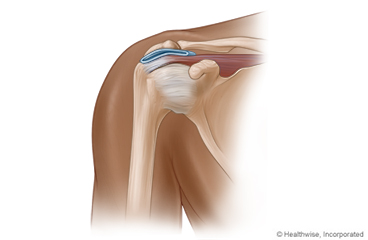
What is shoulder replacement surgery?
In shoulder replacement surgery, a doctor removes the end of the upper arm bone. Often they also take out the end of the shoulder bone. The ends are replaced with plastic or metal pieces.
Your doctor will let you know if you will stay in the hospital or if you can go home the day of surgery. Some people stay in the hospital 1 or 2 days. Your rehabilitation program (rehab) starts when you are in the hospital. You will do this rehab for about 3 months or longer.
After surgery and rehab, you probably will have much less pain than before. And you should be able to return to your usual activities. But your doctor may advise you not to do activities that put stress on that shoulder, such as weight lifting or tennis.
How do you prepare for surgery?
Surgery can be stressful. This information will help you understand what you can expect. And it will help you safely prepare for surgery.
 Preparing for surgery
Preparing for surgery
- You may need to shower or bathe with a special soap the night before and the morning of your surgery. The soap contains chlorhexidine. It reduces the amount of bacteria on your skin that could cause an infection after surgery.
- Be sure to have extra help at home. This is most important if you live alone or care for another person.
- Be sure you have someone to take you home. Anesthesia and pain medicine will make it unsafe for you to drive or get home on your own.
- Understand exactly what surgery is planned, along with the risks, benefits, and other options.
- If you take a medicine that prevents blood clots, your doctor may tell you to stop taking it before your surgery. Or your doctor may tell you to keep taking it. (These medicines include aspirin and other blood thinners.) Make sure that you understand exactly what your doctor wants you to do.
- Tell your doctor ALL the medicines, vitamins, supplements, and herbal remedies you take. Some may increase the risk of problems during your surgery. Your doctor will tell you if you should stop taking any of them before the surgery and how soon to do it.
- Make sure your doctor and the hospital have a copy of your advance directive. If you don't have one, you may want to prepare one. It lets others know your health care wishes. It's a good thing to have before any type of surgery or procedure.
What happens on the day of surgery?
-
Follow the instructions exactly about when to stop eating and drinking. If you don't, your surgery may be canceled. If your doctor told you to take your medicines on the day of surgery, take them with only a sip of water.
-
Follow your doctor's instructions about when to bathe or shower before your surgery.
- You may be given a special soap to use. If you're allergic to the special soap, ask your doctor how to wash your skin. Do not apply lotions, perfumes, deodorants, or nail polish.
-
Do not shave the surgical site yourself.
-
Take off all jewelry and piercings. And take out contact lenses, if you wear them.
At the hospital or surgery center
-
Bring a picture ID.
-
The area for surgery is often marked to make sure there are no errors.
-
You will be kept comfortable and safe by your anesthesia provider. The anesthesia may make you sleep. Or it may just numb the area being worked on.
-
The surgery usually takes 1 to 3 hours.
When should you call your doctor?
- You have questions or concerns.
- You don't understand how to prepare for your surgery.
- You become ill before the surgery (such as fever, flu, or a cold).
- You need to reschedule or have changed your mind about having the surgery.
Where can you learn more?
Go to http://www.healthwise.net/patientEd
Enter H890 in the search box to learn more about "Shoulder Replacement: Before Your Surgery".
Current as of: July 31, 2024
Author: Ignite Healthwise, LLC Staff
Clinical Review Board
All Healthwise education is reviewed by a team that includes physicians, nurses, advanced practitioners, registered dieticians, and other healthcare professionals.

